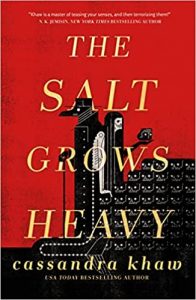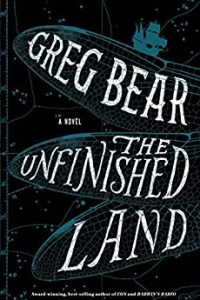Caren Gussoff Sumption Reviews The Salt Grows Heavy by Cassandra Khaw
 The Salt Grows Heavy, Cassandra Khaw (Tor Nightfire 978-1-25083-091-3, $21.99, 112pp, hc) May 2023. Cover by Morgan Sorensen.
The Salt Grows Heavy, Cassandra Khaw (Tor Nightfire 978-1-25083-091-3, $21.99, 112pp, hc) May 2023. Cover by Morgan Sorensen.
Cassandra Khaw has cemented their status as horror royalty, once and for all, with their latest novella, The Salt Grows Heavy. All hail and long live!
Here’s the thing, though: I’m not even sure how or where to start telling you about The Salt Grows Heavy. Nothing I say can quite capture the creeping body horror, the marvelous disorientation, or the toothy, sumptuous, and marvelously off-putting prose of the thing. Fans of Khaw’s Nothing But Blackened Teeth will be happy to see that Khaw’s vision and aesthetic remain as dark as ever, and relish that – in my opinion – they have managed to push further into the weird and the unsettling.
The mermaid at the center of the novella is as far from Disney’s Ariel as possible. Whether she was taken from the sea or moved to land willingly is never quite clear – but what is clear is that her marriage to the Prince was not happy, though it was fruitful. The two daughters begotten from the union are, literally, man-eaters, and, as the novella opens, have hunted and eaten all the humans (including their father) and laid waste to the palace. The only others who remain alive are the mermaid and a plague doctor (complete with mask). The doctor is, indeed, a physician, but not a human…exactly. They have been constructed from human parts and brought to life by ‘‘science,’’ à la Shelley’s Frankenstein.
Unlike Shelley’s monster, however, the plague doctor has the chance to become part of human society, and thus, developed a ‘‘civilized’’ morality and gentleness – which makes them an excellent foil for the cold practicality of the mermaid. Please note: when this reviewer describes the mermaid as cold, there’s no value judgment implied. The mermaid is neither good nor evil, but, instead, driven by a worldview and an ethics unconcerned with human matters. She initially aligns with the doctor to leave the ravaged kingdom because she determines it is best for her own survival. Unwittingly, this decision begins one of the most uncanny buddy-road-trip sequences ever.
As they travel, the two develop a deep bond, based on mutual recognition of one another’s strangeness and a kind of radical acceptance of that strangeness. Before they get too far, however, they come across a group of children who are playing a horrific game, chasing and, then, murdering one of the group, designated as the ‘‘pig.’’ The mermaid is disinterested, but the plague doctor insists that they investigate, especially when the children divulge their leaders, whom they call the ‘‘Saints,’’ will simply bring their slaughtered comrade back to life – and that this is a game they play frequently.
The children lead the Mermaid and Doctor to their small village. It is entirely populated by children, who all revere these Saints – three surgeons who the Plague Doctor realizes are their own creator. The Saints have continued their macabre research on creating and extending life by experimenting on the children, all of whom have been repaired and rebuilt using (and trading) parts of one another (and, occasionally, breaking down one child entirely for ‘‘parts’’). Like the Doctor, the children’s essential self has been condensed into a small, organic egg-like structure called a ‘‘bezoar,’’ which can be placed inside, ostensibly, any body. The Saints have promised the children this will lead to a perfect world of enlightenment, near-paradise, and the children have fully bought into this dream.
The Doctor is horrified. The Mermaid is less shocked and upset, but, willing to support her friend, helps hatch a plan to sow doubt amongst the children, and, hopefully, set them free from the tyrannical abuses of the Saints. Nothing goes according to plan, and while the children are – eventually – freed from the cultlike hold of the Saints, it doesn’t happen before there is a full-on bloodbath, where half of them are sacrificed for (or against) this promise of everlasting life and enlightenment.
In the end, the Doctor chooses to die to free the children. The Mermaid, bewildered by her friend’s dedication, tries to save them. She is unsuccessful, but she has paid attention to both the machinations of the Surgeons and the gentleness of the Doctor. So, though it may take her centuries to do it, she vows to keep the Doctor’s bezoar safe until she can bring them back to life.
There’s always been a fine line between fairy tale and nightmare. Grab any classic tale, and you’ll find they’re full of ghastly doings – frequent aimed at women, children, animals, anyone vulnerable. However, fairy tales cloak their violence in code and euphemism; they are present, but easily overlooked, the horror downplayed. Khaw has none of that: drawing back the allegorical veil, and uncensoring the primal violence contained within. People are flayed, torn, literally asunder. The threat of eating children is realized. It’s visceral and not for everyone. But for those of us who find darkness irresistible, especially when beautifully presented, The Salt Grows Heavy is a grotesquely perfect feast.
Caren Gussoff Sumption is a writer, editor, Tarot reader, and reseller living outside Seattle, WA with her husband, the artist and data scientist, Chris Sumption, and their ridiculously spoiled cat-children.
Born in New York, she attended the University of Colorado, the School of the Art Institute of Chicago, Clarion West (as the Carl Brandon Society’s Octavia Butler scholar) and the Launchpad Astronomy Workshop. Caren is also a Hedgebrook alum (2010, 2016). She started writing fiction and teaching professionally in 2000, with the publication of her first novel, Homecoming.
Caren is a big, fat feminist killjoy of Jewish and Romany heritages. She loves serial commas, quadruple espressos, knitting, the new golden age of television, and over-analyzing things. Her turn offs include ear infections, black mold, and raisins in oatmeal cookies.
This review and more like it in the July 2023 issue of Locus.
 While you are here, please take a moment to support Locus with a one-time or recurring donation. We rely on reader donations to keep the magazine and site going, and would like to keep the site paywall free, but WE NEED YOUR FINANCIAL SUPPORT to continue quality coverage of the science fiction and fantasy field.
While you are here, please take a moment to support Locus with a one-time or recurring donation. We rely on reader donations to keep the magazine and site going, and would like to keep the site paywall free, but WE NEED YOUR FINANCIAL SUPPORT to continue quality coverage of the science fiction and fantasy field.
©Locus Magazine. Copyrighted material may not be republished without permission of LSFF.







